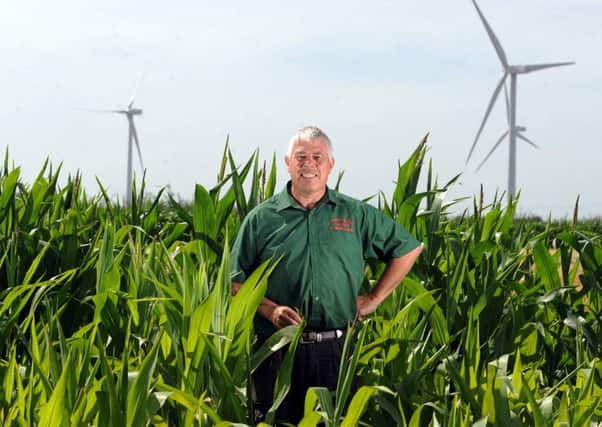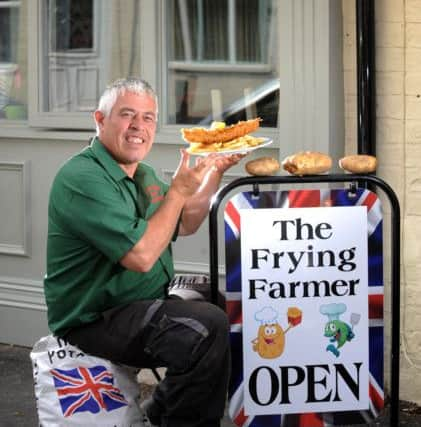Farm of the Week: Branching out takes spuds from the field to the fryer


While other takeaways have taken their shares of the market, fish and chip shops still retain a special place at the seaside. On the East Riding coastline the relationship between the essential ingredients potatoes, haddock or cod is even more entrenched with the historic fishing fleets of the east coast and Humber and the spud growing territory of the Wolds and Holderness nearby.
Arable farmer Andrew Smales has joined the frying fraternity with his aptly named The Frying Farmer restaurant and fish and chip shop in Aldbrough just south of Hornsea. Andrew and his father Jack farm across 2,500 owned acres from the home base of Manor Farm in the delightful village of Burton Pidsea. Andrew lives in Catwick.
Advertisement
Hide AdAdvertisement
Hide AdThe family’s potato growing exploits have led to the new venture. They are one of the largest growers in Holderness with a whopping 750 acres of them and have plans to increase that to 850 by next year. Their main customer is McCain’s, who they supply with 10 to 12,000 tonnes a year - to give some form of context, The Frying Farmer will only need around 30 tonnes a year.


“I’ve always fancied having a fish and chip shop because with us growing such a lot of spuds it allows us to get that step closer to the customer,” Andrew said. “We’re lifting potatoes half a mile away from the shop and delivering them straight in, which means we’re as close as you can get to today’s demand for local produce. We’re using the Sagitta variety as it provides a nice chip that when fried will keep golden.”
The family bought the fish and chip shop last year and opened the restaurant two weeks ago after purchasing the house next door.
Andrew said: “As well as the summer tourist trade there are a lot of people who live in Aldbrough and the surrounding villages and there is very little choice of places to eat. We also have a good relationship with the George and Dragon pub across the road who let our customers use their car park and we encourage them to have a pint.
Advertisement
Hide AdAdvertisement
Hide Ad“It’s a learning curve, but it’s going well, we’re getting a great response from customers and we intend to expand the menu further. We already serve a range of breakfasts, pies, cakes, coffees and teas and we’re going to expand the potato varieties we use too as some prefer baked potatoes to chips. We’re going to be using the variety Manitou which is a red-skinned and very buttery potato.”


One new enterprise often leads to another and Andrew is already supplying another fish and chip shop in nearby Burstwick and has put in a new bagging plant to market Smales’ own brand of potatoes for chipping. They will be sold in 25 kilo bags to other fish and chip shops and local merchants.
“We should shortly have around 500 tonnes to put to the market through Albert Williamson of Ellerker. It’s another avenue for us in addition to our excellent relationship we’ve built up with McCain’s over the years. We grow the varieties Pentland Dell and Innovator for them, as their chips are going into very different markets to the fish and chip shop game and require other qualities. We’ve won three major awards with McCain’s over the years so we must be doing something right.”
Only 180 of the Smales’ 2,500 acres are down to potatoes. The other 570 acres are grown on other farmers’ land. The kit they use is the very latest potato harvesting equipment.
Advertisement
Hide AdAdvertisement
Hide Ad“We get on very well with our farmer growers and with our investment in modern farm machinery technology we’re able to keep everyone’s land in good nick. We run two Grimme Tectrons that have monitors and cameras all around feeding the operator everything he needs to know. They are four-row harvesters on tracks, which means they save on ground compaction. The Tectrons have 15-tonne bunkers on them, which also helps as they can be parked at the headland to receive the potatoes rather than being in the field.”
Andrew’s grandfather John Edward Smales and his brothers all farmed in Holderness. Jack bought Cliff Farm in Waxholme near Withernsea in 1962 where Andrew was born, before purchasing and moving to another Cliff Farm in Tunstall in 1970 when Andrew was just 7 years old. He also took on his father’s Hall Farm at Tunstall and with the acquisition of further acreage the overall farm operation had grown to 320 acres by the early 80s. At that time pigs, cattle, cereal and vegetable crops were the order of the day with a herd of 300 Landrace X Large White sows and a beef fattening unit.
“We went out of cattle in the mid-90s, purchased another 300 acres at Hilston and 140 acres in Roos so that by the end of the 90s we were at 800 acres. Right from our Waxholme days we’d been growing cereals, sprouts, cauliflowers, onions and potatoes – but just 20 acres. It was the late 90s that we started increasing our potato acreage but still only to around 40 to 60 acres. We’d begun concentrating more on potatoes and onions than the other vegetables. Our next move came in 2005 when Tony Ellis of Sand le Mere Caravan Park approached us to buy 80 acres to extend because he was losing land due to coastal erosion. That’s when we came to Manor Farm in Burton Pidsea, doubling our acreage to 1600. In 2008 we bought another 400 acres at Catwick and we’ve added more land around Burton Pidsea since.”
There is a biomass boiler at Manor Farm using oilseed rape straw that powers the grain dryers, farmhouse, bungalow, office and workshops. Jack and Andrew are also involved in drainage schemes in Holderness, running a dredger to assist in maintenance of Keyingham Main Drain and the flow into the Humber.
Advertisement
Hide AdAdvertisement
Hide AdAndrew has two sons Sam, 25, and Max, 23, who both work on the farm. Sam is a fully qualified agricultural machinery technician and Max studied dietician fitness. Andrew is also keen to mention his uncle Charlie who has helped out massively over the years. They all chip in!